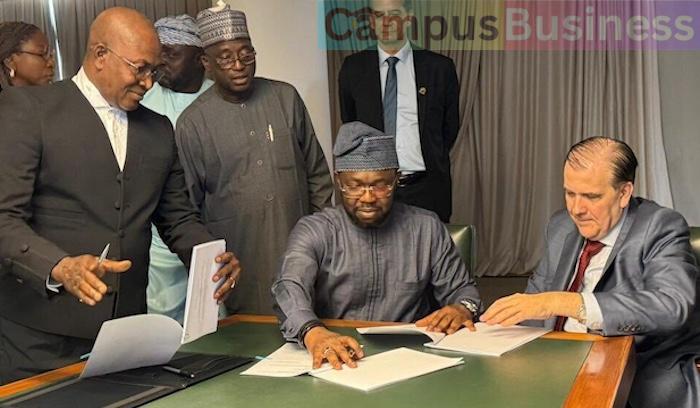Campus Business (November 25, 2024) – The Federal Government of Nigeria, through the Ministry of Agriculture and Food Security (FMAFS), has entered into a strategic partnership with Brazil’s Fundação Getulio Vargas (FGV) to revolutionize agribusiness across Nigeria’s 774 local government areas.

The Memorandum of Understanding (MoU) was signed at the FGV Headquarters in Rio de Janeiro, Brazil, during the G20 Leaders’ Summit. The agreement prioritizes private sector development in fertilizer production, hybrid seed technology, and agricultural finance.
Mr. Temitope Fashedemi, the Permanent Secretary of FMAFS, signed the MoU on behalf of Nigeria, while Professor Carlos Ivan Simonsen Leal, President of FGV, represented Brazil. Speaking on the partnership, Fashedemi noted the immense potential for collaboration in Nigeria’s growing agricultural sector.
“This partnership paves the way for Brazil to engage with Nigeria’s dynamic and rapidly growing agricultural sector. Together with FGV, we are poised to unlock the potential of private sector investment in key areas critical to our food security,” Fashedemi stated.
Link to Green Imperative Project
The MoU is part of the Green Imperative Project (GIP), a $1.2 billion initiative launched in 2018 to modernize Nigeria’s agricultural landscape using Brazilian expertise in tropical agriculture. Backed by Deutsche Bank, the 10-year project seeks to deliver transformative agricultural technologies and capacity-building programs.
Key Goals of the Green Imperative Project:
- Empowering one agribusiness in each of Nigeria’s 774 LGAs with technical and financial support over five years.
- Attracting $4.3 billion in private-sector investments in fertilizer production, hybrid seed technology, and agricultural finance.
- Enhancing sustainable agricultural practices to improve food security.
Professor Leal highlighted Brazil’s commitment to the collaboration, stating:
“Brazil is eager to transfer its expertise in tropical agriculture to support Nigeria’s journey towards food security and economic growth.”
Broader Context: Nigeria’s Agricultural Revamp
The Nigerian government has intensified efforts to transform its agricultural sector through key partnerships and investments. Recently, Brazilian meatpacking giant JBS committed $2.5 billion to Nigeria’s livestock sector. The funds will establish six factories over five years, focusing on poultry, beef, and pork production.
In addition, Mastercard has partnered with the federal government to enhance financial inclusion for farmers across Africa.
Senator Abubakar Kyari, Nigeria’s Minister for Agriculture and Food Security, emphasized the ministry’s focus on improving food security through agro-input distribution, agricultural institution reform, and strengthening local farming communities.
“As part of our focus, we are prioritizing the distribution of agro-inputs to farmers, repositioning agricultural institutions, and fostering deeper engagement between farmers, herders, and local communities,” Kyari explained.
Kyari also outlined collaborative efforts to improve irrigation systems, enhance soil fertility, and develop agricultural research infrastructure. “These initiatives aim to promote sustainable agricultural practices and bolster Nigeria’s food production capabilities,” he added.



Post Comment